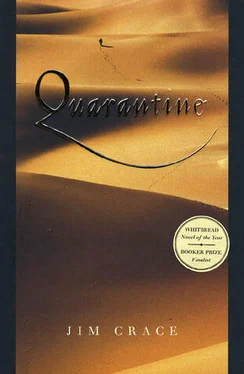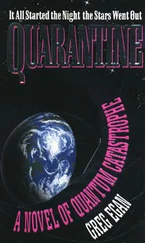Jim Crace - Quarantine
Здесь есть возможность читать онлайн «Jim Crace - Quarantine» весь текст электронной книги совершенно бесплатно (целиком полную версию без сокращений). В некоторых случаях можно слушать аудио, скачать через торрент в формате fb2 и присутствует краткое содержание. Год выпуска: 1998, Издательство: Straus and Giroux, Жанр: Современная проза, на английском языке. Описание произведения, (предисловие) а так же отзывы посетителей доступны на портале библиотеки ЛибКат.
- Название:Quarantine
- Автор:
- Издательство:Straus and Giroux
- Жанр:
- Год:1998
- ISBN:нет данных
- Рейтинг книги:4 / 5. Голосов: 1
-
Избранное:Добавить в избранное
- Отзывы:
-
Ваша оценка:
- 80
- 1
- 2
- 3
- 4
- 5
Quarantine: краткое содержание, описание и аннотация
Предлагаем к чтению аннотацию, описание, краткое содержание или предисловие (зависит от того, что написал сам автор книги «Quarantine»). Если вы не нашли необходимую информацию о книге — напишите в комментариях, мы постараемся отыскать её.
Quarantine
Quarantine — читать онлайн бесплатно полную книгу (весь текст) целиком
Ниже представлен текст книги, разбитый по страницам. Система сохранения места последней прочитанной страницы, позволяет с удобством читать онлайн бесплатно книгу «Quarantine», без необходимости каждый раз заново искать на чём Вы остановились. Поставьте закладку, и сможете в любой момент перейти на страницу, на которой закончили чтение.
Интервал:
Закладка:
Musa found no pleasure in the footprints that he left, or the suckered protests that his sandals made in the mud as he buried them and lifted them. His tracks were deep and obvious. He would have preferred to have left no marks at al, no debts. Caravanners like to come and go, according to the verse, And let the dust that they have raised, Fill in the footprints they have made.
It was not long before Musa spotted movement at the far end of the pans. The sun was in his eyes but he was sure that there was someone coming up towards him, a someone who was light enough to walk across the mud without their sandals sticking. It might be the badu, or the blond returned from his hopeless vigil on the promontory. Musa would demand some help with walking. It might even be his wife, collecting herbs or bringing up a flask and blankets to her ailing husband at first light as she’d been told. About time too. Musa stopped, rubbed his side, practised breathing awkwardly. He had been il, he must remember that. He was recovered but still weak, he’d say. Another miracle.
But it was Jesus walking in the mud, bare-footed, naked, thin and brittle as a thorn. So, then, Shim’s bogus, midnight mission had been fruitful after all. His vigil on the promontory at Musa’s behest — ‘Say that I’ll die unless he comes’ — had worked where al the other days of prayers and exhortations had failed. Musa chuckled to himself. He was rewarded for his tricks, no matter what he did. His little Gaily had appeared at last. He’d come up from his cave to cure Musa for a second time. This second miracle would be an easy one. He’d only have to exorcize the demons from Musa’s hip and knee, and scrape away a little mud. He’d only have to wipe away a lie.
Musa did not take another step. He waited while the man approached, as thinly as an egret, his body wasted to the bone, his too large hands and feet, his swollen joints. Only his genitals seemed unaffected by the fast. This was nothing. Musa was not shocked. He’d seen worse sights before than naked mystics. In his travels, he’d seen recluses who’d made themselves as yellow and transparent as amber by their deprivations. He’d seen the hennits ofKhaloun who fed on insects, nothing else. Their skins were hard and cracked like cockroaches. He’d seen worse ulcers, looser teeth, more hollow eyes. But he had never seen a man appear so weightless and invincible as Gaily seemed to be.
Musa did not know what he should do. Salute the man when he arrived like an old friend? Fall down on his knees, or run, though both were difficult for someone of his size and in mud that deep? Pretend to be still ill and in need of healing? Could he fool Jesus with his tricks? Musa compromised. He took one step backwards, held his side and winced, and almost crouched, not quite a deferential bow, not quite a posture of defence, not quite an ambush. He was stooped too low to see the Gally now. He waited for the figure to come closer, oddly fearful of it but triumphant, too. Another victory. Here was the one who’d tipped the water on to Musa’s lips and cheeks. Here was the face that he’d last seen a whisper from his nose, inside the tent. The peasant’s and the robber’s face. The healer’s face. From that distance in the open scrub, it had not seemed so young as it had been when they first met. The hair was pale. The body was the colour of the land behind.
What should Musa say to greet his Gaily? It was embarrassing. He could hardlycall out, ‘Good morning, cousin. Know my face?’ as ifthey were chattering acquaintances from some market-place. Or, ‘I’m the one that comes for you each day. At last we meet again. .’ or, ‘Speak to me, then. We were good cousins thirty days ago. This is my land.’ Such pleasantries were not appropriate for one so holy and so thin. But Musa need not have worried what to say. His Gally would not cross the mud to stroke his eyelids with his thumb or talk to him or pass his judgement on the landlord’s weaknesses. When Musa stood and looked again, the man was at a greater distance and almost indistinguishable from the shadows and the bushes. He had taken a lower path, through a sloping basin of thorn and rock, and was walking away from Musa with the confidence of someone who was full of god at last.
Musa watched — relieved, rebuffed — as Jesus set off up the scarp, his body bones combining with the scrub rocks and the sunlight to make a hard-edged pattern which pulsed and slanted all at once. Musa put his hands up to his mouth. ‘What do you want?’ he called. The Galy did not seem to hear. He was too far away. He pulsed and slanted, disappeared, became a man again a few steps higher up the slope, was lost between the landscape and the sun. Who was he looking for, if not the merchant king? Had he come for the water in the cistern? Or was he heading for the woman in the cave?
The air became much colder than it ought to have been. Musa barely dared to breathe. He could have sworn the man was glowing blue and yellow, like a coal.
26
It was Aphas who saw Musa first, a little after dawn, coming slowly through the rocks towards the flattened tent, wearing his boots of mud, his hair heavy with sweat. He did not seem so big somehow, as if a single night of quarantine up at the caves had been enough to shorten and to narrow him. Even the goats could tell he had improved. They did not scatter when he walked amongst them as they usuaHy did. He did not try to kick their legs.
‘Your man is back,’ said Aphas, ‘Look.’ Mira looked, and so did Shim. They did not run to greet him, glad that he’d survived another illness and was well enough to walk. Their day-dreams perished at the sight of him. They stayed on the panels of the tent as if they thought the wind could strike up again at any moment, and waited for him to rage at what had happened to his home. Miri knew what he would do and say. He’d twist her wrist: ‘What use are you? Look what you’ve done in just one night.’ He would not be ashamed to slap her ears, even with Shim and Aphas looking on. He’d slap their ears as well, if he had half a chance.
But no, he merely shook his head and rolled the broken tent poles with his foot.
‘You’ll have to make another one,’ he said, ‘when we get down to Jericho.’ He looked at Miri, sitting amongst the few possessions she had rescued from the wind, the finished birth-mat on her lap, untied, her broken loom in pieces at her feet, her face and hair made ashen by the dust. ‘You’ll have to get another loom.’
‘How is your stomach, then?’ she said, still nervous of the man. ‘We prayed for you, I promise. We sang for you al night. . ’
‘Your prayers were answered. See? I’m well. The wind has blown all the pain away. My wind in here. .’ he rubbed his stomach, ‘. . became the wind outside. See what it’s done.’ He shrugged again, and spread his hands above the tent, a stoic almost. ‘This is the price we pay.’
What should they make ofMusa now? To those survivors at the tent, he seemed transformed. They all had been transformed by the bombast of the winds, of course. There’s nothing more dispiriting than clinging to a flattened tent at dawn with nothing looming up to help beyond the scrub except more scrub. They had been circled seven times in the night. The wind had sounded seven fanfares on its hom. And their skin city had been levelled to the ground. There are no kinder winds than that. There isn’t one that comes along and puts up tents. But Musa, they supposed, had more reason to be dispirited than any of them, if he was human. Even though he’d missed their dramas with the tent. He had been badly ill, and must be more humbled and exhausted by his struggles. The idea that the midnight wind had originated in Musa’s stomach did not seem far-fetched, to Aphas at least. His stomach was large enough to lodge a storm. And demons could take many shapes. A demon driven out of Musa’s gut where it was warm and comfortable might want to take revenge on Musa’s tent. That much was logical. He sympathized with that. What had his landlord said, those many days ago? ‘I only have to belch for there to be a storm.’ Perhaps he’d belched so great a storm that all his rage was spent against the scrub, and he was left as harmless and as fragile as a blown egg. An empty sheH.
Читать дальшеИнтервал:
Закладка:
Похожие книги на «Quarantine»
Представляем Вашему вниманию похожие книги на «Quarantine» списком для выбора. Мы отобрали схожую по названию и смыслу литературу в надежде предоставить читателям больше вариантов отыскать новые, интересные, ещё непрочитанные произведения.
Обсуждение, отзывы о книге «Quarantine» и просто собственные мнения читателей. Оставьте ваши комментарии, напишите, что Вы думаете о произведении, его смысле или главных героях. Укажите что конкретно понравилось, а что нет, и почему Вы так считаете.












